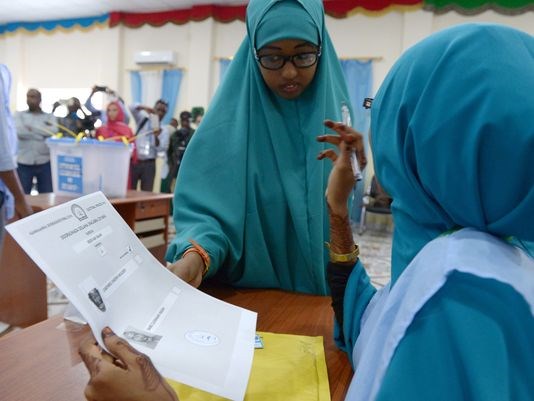
Monday January 16, 2017

This photo taken on Nov. 16, 2016, shows a Somali poll worker, right, explaining the voting procedure to a voter before she casts her ballot in Baidoa.
MOGADISHU, Somalia — Africa's most chaotic country is struggling to elect its first democratic government in a half-century.
Given its recent history for war and turmoil it's not surprising that Somalia's fledging effort at democracy has been marred by delays, corruption and allegations of vote-buying.
Since October, people have gone to polling stations across the country to cast ballots as part of a complex process to choose members of parliament who will then vote for a new president and prime minister. The goal is to install the Horn of Africa nation's first representative leadership since dictator Mohamed Siad Barre ousted a popularly elected government in a 1969 military coup.
He was overthrown in 1991, engulfing Somalia in a bloody civil war — first between clan militias and then by the al-Shabab terrorist group, which continues to control swaths of territory.
“The last 25 years have been particularly bad with ... the state destroyed,” said Michael Keating, the U.N. special representative for Somalia. This is "the first time since 1969 that the Somalis are attempting to put together a rules-based process involving quite a large number of people to bring about a peaceful transfer of power.”
Though Somalis were promised a direct election for 2016, political leaders instead designed an indirect vote: 14,025 delegates chosen by 135 clan elders are electing members of the lower house of parliament. The clan elders are choosing the upper house members, and the two houses of parliament will then elect a president and prime minister by late January.
The country's last parliamentary election took place in 1984, but was hardly democratic: Strongman Siad Barre only allowed voters to approve a list of 171 members of parliament his regime had chosen.
An indirect process was created for the latest elections, because Somalia has no court system to handle any election disputes and no national census to register voters.
For many Somalis, the lack of promised universal suffrage represents a continuation of government by a powerful elite.
“We are hearing that corruption is high. We are hearing people have been excluded from becoming candidates, and regional administrators are abusing their power,” said Mursal Saney, deputy director of the Heritage Institute for Policy Studies in Mogadishu. “It's unfair to empower a political elite that already was dominated and to keep others outside the power.”
During negotiations by clan elders on who to choose, seats were being sold for as much as $1.3 million, according to one official involved in the electoral process who was not authorized to discuss the issue publicly.
In a country where 73% of the population lives below the poverty line, many Somalis see the widespread graft as an indication that the elites aren't serving the country's pressing needs. “We as a civil society would like for the money that is being spent on vote-buying to be spent on the establishment of social services like schools, hospitals, clean water, electricity,” said Abdullahi M. Shirwa of Somalia Peace Line, a non-profit group in this capital city.
Jiiddu Clan elder Suldan Warsame Aliyow admitted that the election has involved some misconduct, but few of the allegations could be proven by the Independent Election Dispute Resolution Committees.
"I'm sure it's not a 100% perfect system, but in every election happening everywhere in the world there are always complaints (of corruption), even in America," he said.
One change that is winning praise is that women get 30% of the seats in both houses of parliament, long dominated by men. “Women are no longer onlookers but active participants in matters that affect them,” said Hamsa Sheikh Hussein, a newly elected female member of parliament in Kismayo.
Hussein says she does not believe the 30% quota will be met, and that those women who do win seats will face tough opposition from male colleagues once parliament is in session.
Her district includes an area still largely controlled by al-Shabab, which remains a continual threat despite the presence of 17,000 African Union peacekeepers in Somalia.
The terrorist group, which has links to al-Qaeda, targeted clan elders and government officials in the past six months to derail the electoral process.
“Their goal has always been to disrupt government operations in Somalia ... to cause an image of insecurity and fear in this country,” said Lt. Joe Kibet, spokesman for the African Union Mission.
Security concerns and logistical problems have delayed the presidential vote three times, but electoral officials hope the vote will occur in January. After that, parliament can begin finalizing a provisional constitution and defining the roles of government positions.
“You know there aren’t often periods in a nation’s history where it has to design itself,” said the U.N.'s Keating, “and that’s what the Somalis are doing.”